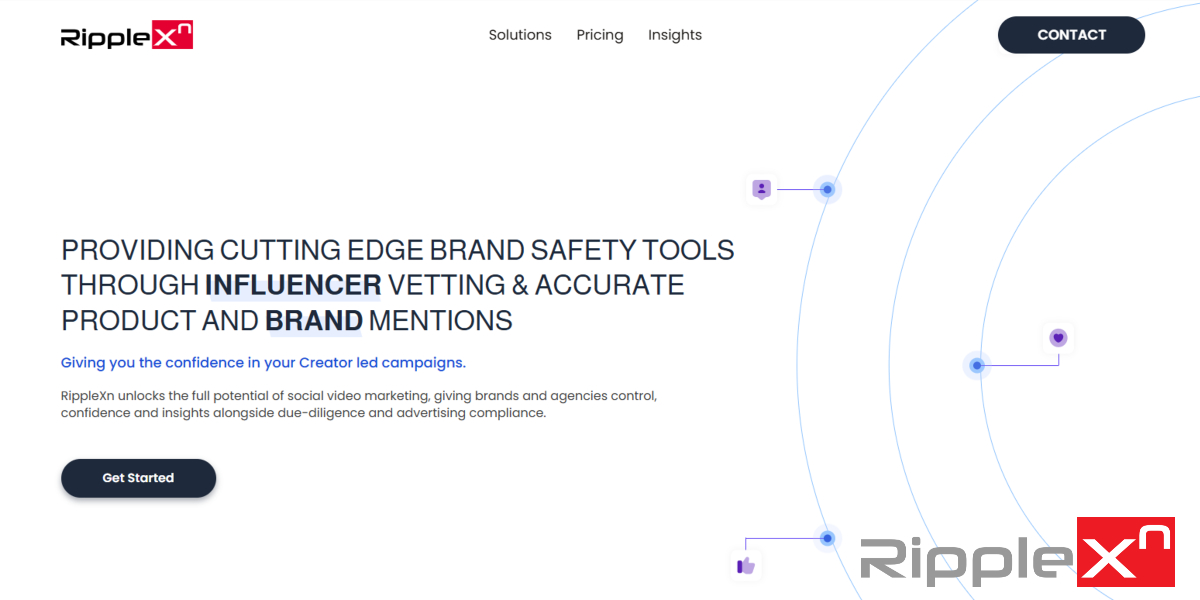Artificial Intelligence (AI) is transforming how brands and businesses engage with customers, but it’s not without its challenges. While AI has unlocked new levels of efficiency, innovation, and data-driven insights, there are still limits preventing it from reaching its full potential.
For marketing professionals, especially those focused on influencer marketing and social media, understanding these limits is critical to staying competitive. Plus, there are a whole other range of uses for marketing intelligence and strategy development.
In this article, we’ll explore the common limits of AI, how it’s currently being used in marketing, and how RippleXn’s unique social intelligence data can help businesses overcome these challenges.
What is limiting AI integration into enterprise sized businesses?
1. One-size-fits-all approach to AI and its applications
One of the biggest hurdles is the term ‘AI’. Everything from automated chatbots to image generation to market analysis can partially or solely rely on Artificial Intelligence components to operate, with varying degrees of risk and oversight required.
Fortunately, many brands are taking a highly structured approach to understanding use cases and the implications - much like the processes businesses adopted when preparing for the implementation of GDPR and the ‘journey’ of personal data as it progresses through the marketing machine and all manner of applications.
AI tools are not a blocker; they’re an inevitability, and those that adapt, understand, and navigate quickly will be able to exploit a short window of competitive advantage while less nimble organizations catch up or adapt.
2. Dependence on data quality
AI is only as good as the data it’s fed. In marketing, this means relying on vast amounts of customer and market data to make accurate predictions and decisions. Poor data quality, fragmented information, or biassed datasets can significantly hamper AI's performance. This is especially true in influencer marketing, where bad data can lead to misguided partnerships or ineffective campaigns. To-date most widely used data sets are 3rd party aggregations of platform API’s ‘public data’ feeds. So, nothing here is unique or customised to your specific needs.
RippleXn addresses this directly. By listening more accurately to what’s said in social media videos, especially brand mentions and product names, we ensure the data you could use is accurate and actionable. If your AI can’t identify the right products or content, your decisions won’t be informed by the best data.
3. Technology integration issues
Integrating AI into existing systems can be another roadblock. Many businesses struggle to align AI solutions with legacy systems or enrich current data sets with AI powered insights. This lack of integration can prevent AI from delivering its full value in areas like campaign personalization or competitive analysis. Plugging in an API is relatively easy ,and to be honest, desirable. The real challenge is imagination on what data sets, what live data, what unique data can be found and used to augment existing data. Integration may be more stakeholder than technical!
4. Ethical and regulatory concerns
As AI becomes more prevalent, ethical issues around privacy, data usage, and transparency continue to grow. Regulatory frameworks like GDPR also limit the ways businesses can use AI for customer insights and targeting. Brands need to navigate these concerns carefully to avoid legal pitfalls and maintain consumer trust. As internal teams rush to empower AI through blended stakeholder groups or regular legal teams, knowledge of what things are, what they do, how they could replace a human decision or generate outcomes where accountability is uncertain. These are all real concerns.
Buying in a model can add complexity to your organization too. Have you asked about the training data, its providence, whether its collection now allows resale. 2024 into 2025 is likely to see much progress, many lawsuits and many cautionary tales.
How AI is being used in marketing today
Despite the challenges, AI is making significant strides in the marketing world. Here’s a look at some examples of how AI is driving marketing success today:
- AI-driven customer personalization: AI is helping brands create hyper-personalized experiences by analyzing user behavior and preferences to deliver tailored content and product recommendations.
- Sentiment analysis in social media: AI tools are increasingly being used to gauge public sentiment around brands, products, and influencers by analyzing social media conversations. This enables marketers to respond quickly and adjust campaigns in real time and even produce the reply assets.
- Competitor research & social listening: AI makes it easier than ever to track competitor strategies from their public works, analyze market trends, and monitor social media buzz. Social listening tools powered by AI provide deeper insights into what’s resonating with audiences, giving brands a competitive edge quicker than ever before.
Biggest barriers to AI effectiveness in marketing
Even with its exciting potential, AI adoption in marketing faces barriers:
- Lack of skilled talent: There’s a shortage of marketers and data scientists who understand both AI and marketing strategy, which limits AI's widespread implementation.
- High costs of AI solutions: AI implementation can be costly, especially for smaller businesses that don’t have the budget to invest in cutting-edge technology and skilled personnel.
- Resistance to change: Organizational resistance from teams not ready to adapt to AI tools can slow down the adoption process. Marketing teams need to build a culture of innovation and adaptability to make the most of AI. This could be helped with outsourced standalone projects in the first instance.
- Opportunity costs. Prioritization is super important. And doing this (properly) means you may not be able to do something else.
How RippleXn can help your AI-powered marketing
RippleXn empowers marketers by providing the tools they need to overcome many of the barriers mentioned above. Here’s how we can help:
- Better influencer vetting: RippleXn’s advanced analytics allow brands and agencies to choose the right influencers for their campaigns by providing accurate insights on sentiment, audience engagement, and brand safety by understanding accurately the contents of social video on-top of just the meta datas.
- Marketing campaign insights: Our platform helps you understand your marketing campaigns better by analyzing the sentiment and substance of social media videos, giving you deeper insights into what’s working and where improvements are needed.
- Competitor and market research: With our powerful social listening tools, you can expand your research capabilities and gather actionable data on your competitors and market trends. This enables more informed decision-making and campaign optimization. Follow hashtags, competitors themselves, their campaigns or a sample of ideal customer profile accounts to know what they think, what they say and their opinions.
- Ambassador program monitoring: RippleXn’s tools make it easier to monitor and manage ambassador programs, ensuring alignment with your brand's values and messaging. If you have a Creator working for you ‘1 day’ per month, you may want to know what, and how they are saying things the other 29 days!
Improve your AI marketing with RippleXn
RippleXn listens to social media videos with unmatched accuracy, providing detailed insights that fuel your marketing strategy. By leveraging RippleXn’s API, you can seamlessly integrate high-quality data into your campaigns, helping to overcome the “data thirst” problem many businesses face.
Don’t let poor data or AI limits hold back your marketing efforts. Reach out to RippleXn today and unlock the full potential of AI in your marketing campaigns.






